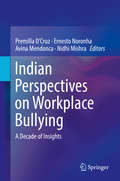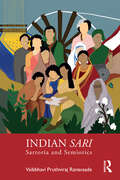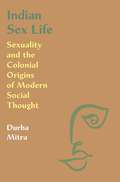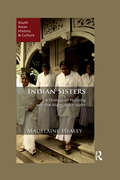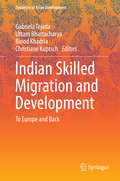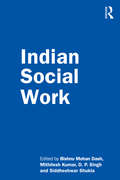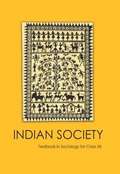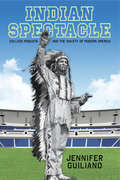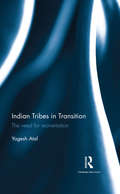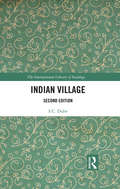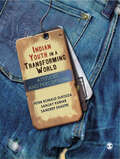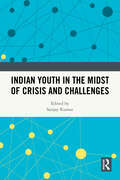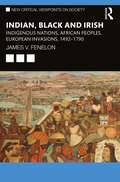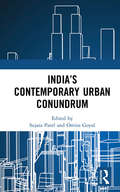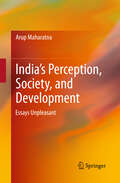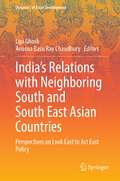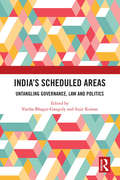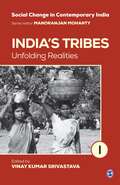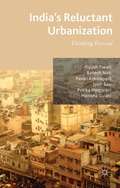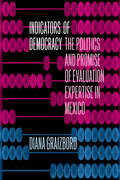- Table View
- List View
Indian Perspectives on Workplace Bullying: A Decade of Insights
by Premilla D'Cruz Ernesto Noronha Avina Mendonca Nidhi MishraThis book, recognizing that workplace bullying is a significant employment relations and occupational health and safety problem in India which warrants urgent and holistic intervention, presents empirical studies examining contextual factors, antecedents, mediators, moderators, processes, outcomes and solutions, thereby deepening our understanding of the phenomenon. The chapters showcased in the volume emphasize the paradoxical Indian sociocultural ethos whose simultaneous embrace of humanism versus identity-based, personalized and hierarchical relationships, materialism versus spiritualism and individualism versus collectivism both fuel yet quell misbehaviour. The inquiries which constitute this book engage both positivist and postpostivist paradigms, draw on several theoretical and substantive frameworks, utilize an array of methods, investigate numerous foci and cover various geographical regions in India, a range of industrial sectors and all levels of the organization. In so doing, they make pathbreaking contributions beyond country-specific insights to advance the frontiers of the thematic area worldwide. The chapters include important findings pertaining to digital workplaces, child labour, forgiveness, customer bullying, psychological contract violation, perceived organizational support, psychological capital and comprehensive prevention strategies encompassing psychosocial risks. As well as building on a decade of knowledge about workplace bullying in India, the book puts forward a research agenda on the topic for the subcontinent in particular and the field in general. The volume is of interest to researchers, practitioners and students of organizational studies, human resource management, industrial relations, labour law, corporate law, health sciences and social work.
Indian Sari: Sartoria and Semiotics
by Vaibbhavi Pruthviraj RanavaadeThe sari has remained an essential part of culture, tradition and fashion in South Asia and India through many centuries. This book examines the variety of meanings which it carries as a symbol of Indian femininity and tradition as well as a means of creative fashion expression for modern India. It discusses the semiotic interpretations of the sari today by understanding its significance for traditional weavers, designers and people who wear saris at home, work or for religious or cultural occasions. Through surveys, interactions and interviews, the author explores the shared experience of wearing saris in different social and cultural settings across economic groups in farms and boardrooms as well as a means of creative expression for young Indians. It also looks at the processes involved in making traditional saris today, draping and weaving styles, buying behaviour, saris in pop-culture, pride parades and Bollywood and interpretations of what the sari signifies in different socio-economic circles in India. This book will be of interest to students of fashion, design, fashion business, history and cultural studies. It will also be useful for professionals working in the fashion industry and designers.
Indian Sex Life: Sexuality and the Colonial Origins of Modern Social Thought
by Durba MitraDuring the colonial period in India, European scholars, British officials, and elite Indian intellectuals—philologists, administrators, doctors, ethnologists, sociologists, and social critics—deployed ideas about sexuality to understand modern Indian society. In Indian Sex Life, Durba Mitra shows how deviant female sexuality, particularly the concept of the prostitute, became foundational to this knowledge project and became the primary way to think and write about Indian society.Bringing together vast archival materials from diverse disciplines, Mitra reveals that deviant female sexuality was critical to debates about social progress and exclusion, caste domination, marriage, widowhood and inheritance, women's performance, the trafficking of girls, abortion and infanticide, industrial and domestic labor, indentured servitude, and ideologies about the dangers of Muslim sexuality. British authorities and Indian intellectuals used the concept of the prostitute to argue for the dramatic reorganization of modern Indian society around Hindu monogamy. Mitra demonstrates how the intellectual history of modern social thought is based in a dangerous civilizational logic built on the control and erasure of women's sexuality. This logic continues to hold sway in present-day South Asia and the postcolonial world.Reframing the prostitute as a concept, Indian Sex Life overturns long-established notions of how to write the history of modern social thought in colonial India, and opens up new approaches for the global history of sexuality.
Indian Sisters: A History of Nursing and the State, 1907–2007 (South Asian History and Culture)
by Madelaine HealeyHealth and medicine cannot be understood without considering the role of nurses, both as professionals and as working women. In India, unlike other countries, nurses have suffered an exceptional degree of neglect at the hands of state, a situation that has been detrimental to the quality of both rural and urban health care. Charting the history of the development of nursing in India over 100 years, Indian Sisters examines the reasons why nurses have so consistently been sidelined and excluded from health care governance and policymaking. The book challenges the routine suggestion that nursing’s poor status is mainly attributable to socio-cultural factors, such as caste, limitations on female mobility and social taboos. It argues instead that many of its problems are due to an under-achieved relationship between a patriarchal state on the one hand, and weak professional nursing organisations shaped by their colonial roots on the other. It also explores how the recent phenomenon of large-scale emigration of nurses to the West (leading to better pay, working conditions and career prospects) has transformed the profession, lifting its status dramatically. At the same time, it raises questions about the implications of emigration for the fate of health care system in India. An important contribution to the growing academic genre of nursing history, the book is essential reading for scholars and students of health care, the history of medicine, gender and women’s studies, sociology, and migration studies. It will also be useful to policymakers and health professionals.
Indian Skilled Migration and Development
by Christiane Kuptsch Gabriela Tejada Uttam Bhattacharya Binod KhadriaThis edited contribution explores strategies and measures for leveraging the potential of skilled diasporas and for advancing knowledge-based evidence on return skilled migration and its impact on development. By taking the example of Indian skilled migration, this study identifies ways of involving returned skilled migrants in home country development as well as proposes approaches to engage the diaspora in development. As high-skill immigration from India to mainland Europe is a rather recent phenomenon, the activities of Indian professionals in Europe are under-researched. The findings have wider application in contributing to the policy dialogue on migration and development, specifically to the advantage for developing and emerging economies. The book employs an interdisciplinary, two-fold approach: The first part of the research looks at how international exposure affects the current situation of skilled returnees in India. The second, European, part of the research examines migration policies, labour market regulations and other institutional settings that enable or hinder skilled Indians' links with the country of origin. Structural differences between the host countries may facilitate different levels of learning opportunities; thus, this book identifies good practices to promote the involvement of Indian skilled diaspora in socio-economic development. In applying the framework of diaspora contributions as well as the return channel to study the impact on India, the book draws on qualitative and quantitative research methods consisting of policy analysis, in-depth interviews with key experts and skilled migrants and on data sets collected specifically for this study.
Indian Social Work
by Bishnu Mohan Dash; Mithilesh Kumar; D. P. Singh; Siddheshwar ShuklaThis book provides multiple frameworks and paradigms for social work education which integrates indigenous theories and cultural practices. It focuses on the need to diversify and reorient social work curriculum to include indigenous traditions of service, charity and volunteerism to help social work evolve as a profession in India. The volume analyzes the history of social work education in India and how the discipline has adapted and changed in the last 80 years. It emphasizes the need for the Indianization of social work curriculum so that it can be applied to the socio-cultural contours of a diverse Indian society. The book delineates strategies and methods derived from meditation, yoga, bhakti and ancient Buddhist and Hindu philosophy to prepare social work practitioners with the knowledge, and skills, that will support and enhance their ability to work in partnership with diverse communities and indigenous people. This book is essential reading for teachers, educators, field practitioners and students of social work, sociology, religious studies, ancient philosophy, law and social entrepreneurship. It will also interest policy makers and those associated with civil society organizations.
Indian Society (Sociology) class 12 - Meghalaya Board
by Meghalaya Board of School EducationPublished for the Meghalaya Board of school education, written in simple english, Indian Society is a text book containing 7 chapters for Sociology for the students appearing in the examinations of standard 12.
Indian Society class 12 - NCERT
by National Council of Educational Research and TrainingIndian Society is a text book containing 7 chapters for Sociology by NCERT board for standard 12.
Indian Sociological Thought
by B. K. NaglaIndian Sociological Thought is a comprehensive book for Humanities students who have opted for Sociology in various courses. It comprises of sociological thoughts of a large number of renowned Indian thinkers and Social scientists.
Indian Spectacle
by Jennifer GuilianoAmid controversies surrounding the team mascot and brand of the Washington Redskins in the National Football League and the use of mascots by K-12 schools, Americans demonstrate an expanding sensitivity to the pejorative use of references to Native Americans by sports organizations at all levels. In Indian Spectacle, Jennifer Guiliano exposes the anxiety of American middle-class masculinity in relation to the growing commercialization of collegiate sports and the indiscriminate use of Indian identity as mascots. Indian Spectacle explores the ways in which white, middle-class Americans have consumed narratives of masculinity, race, and collegiate athletics through the lens of Indian-themed athletic identities, mascots, and music. Drawing on a cross-section of American institutions of higher education, Guiliano investigates the role of sports mascots in the big business of twentieth-century American college football in order to connect mascotry to expressions of community identity, individual belonging, stereotyped imagery, and cultural hegemony. Against a backdrop of the current level of the commercialization of collegiate sports--where the collective revenue of the fifteen highest grossing teams in Division I of the National Collegiate Athletic Association (NCAA) has well surpassed one billion dollars--Guiliano recounts the history of the creation and spread of mascots and university identities as something bound up in the spectacle of halftime performance, the growth of collegiate competition, the influence of mass media, and how athletes, coaches, band members, spectators, university alumni, faculty, and administrators, artists, writers, and members of local communities all have contributed to the dissemination of ideas of Indianness that is rarely rooted in native people's actual lives.
Indian Tribes in Transition: The need for reorientation
by Yogesh AtalIndia has witnessed a sea change in its social structure and political culture since Independence. Despite the developmental model that the country opted for, the hangover of the Raj continued to encourage fissiparous tendencies dividing the Indian populace on the basis of religion, ethnicity and caste hierarchy. This book argues for the need to develop a fresh approach to dismantling the stereotypes that have boxed the study of India’s tribal communities. It underlines the significance of region-specific strategies in place of an overarching umbrella scheme for all Indian tribes. The author studies tribes in the context of changing political and social identity, gender, extremism, caste dimensions, development issues, and offers a new perspective on tribes to accommodate the diversity and transformations within culture over time and through globalization. Lucid, accessible and rooted in contemporary realities, this volume will be of great interest to scholars and researchers of sociology and social anthropology, tribal studies, subaltern and third world studies, and politics.
Indian Village (International Library of Sociology)
by S.C. DubeIndian Village is widely considered a "classic." Since its publication, over six decades ago, the book has received immense acclaim, attaining extraordinary success, especially as the first book on a single village in post—Second World War South Asia. Indeed, the work represents a key statement of the wider shift from tribe to village in Indian anthropology, part of the movement away from studies of "isolated" groups toward writings on con-temporary communities in the sociology of the subcontinent. Written in an accessible, intimate manner, Indian Village needs to be understood today as a flagship endeavour of the social sciences in a young, independent India—a study that continues to be generously cited, including as a model monograph, in the disciplines at large.
Indian Youth in a Transforming World: Attitudes and Perceptions
by Peter Ronald deSouza , Sanjay Kumar and Sandeep ShastriThis book comprises the first nationwide study based on face-to-face interviews with 5000 youth to capture the popular mood of this important demographic segment of contemporary India. It records their perceptions of various issues, ranging from modernity, development, globalization and unemployment, to leisure and lifestyle, social networks and family, and their hopes and aspirations for the future. While it breaks some myths about them, on one hand, it helps strengthen some commonly shared perceptions about them, on the other. Indian Youth in a Transforming World: Attitudes and Perceptions underlines that Indian youth reflect an authentic multiplicity of aspirations, ′world views′ and interest, quite like the rich tapestry of India′s diversity. It indicates that they are a mix of continuity with change. However, they stand distinct in many ways from the youth the world over. This book is also likely to break some myths related to the youth, opening avenues for new debates. For example, the study reveals that there is hardly any decline in interest in politics between two generations. The book would be invaluable for professionals in advertising and other media sectors and all those involved in market research. Students and teachers of specialized psychology courses, behavioural sociology, political sociology, social change and modernization will also find it useful.
Indian Youth in the Midst of Crisis and Challenges
by Sanjay KumarOver one-third of the Indian population is made up of young people aged between 15 and 34 years. Such a large, young population is an asset to any nation, but today, young Indians are grappling with multifarious challenges hindering their growth. This book analyses factors that influence the youth’s decision-making processes, their navigation of societal norms, education choices, identity formation, and the evolving perceptions of tradition and modernity. It focuses on the changing patterns of marriage among the Indian youth, the challenges posed by the COVID-19 pandemic, and the ongoing changes in youth transitions and social reproduction in a modern society. The findings presented in the book provide crucial insights into how young Indians perceive their roles within their families, communities, and the broader society. The volume also offers valuable guidance on how to support and empower the next generation to build a resilient and prosperous future.Lucid, accessible, and empirically grounded, the book is indicative of the momentum and direction of change in the country. It will be useful to scholars and researchers of sociology, political sociology, political studies, youth psychology and anthropology. It will also be of interest to policymakers, journalists, and the interested general reader.
Indian, Black and Irish: Indigenous Nations, African Peoples, European Invasions, 1492-1790
by James V. FenelonThis book traces 500 years of European-American colonization and racialized dominance, expanding our common assumptions about the ways racialization was used to build capitalism and the modern world-system. Professor Fenelon draws on personal experience and the agency of understudied Native (and African) resistance leaders, to weave a story too often hidden or distorted in the annals of the academy, that remains invisible at many universities and historical societies. The book identifies three epochs of racial constructions, colonialism, and capitalism that created the USA. Indigenous nations, the first to be racialized on a global scale, African peoples, enslaved and brought to the Americas, and European immigrants. It offers a sweeping analysis of the forces driving the invasion, occupation, and exploitation of Native America and the significance of labor in American history provided by Indigenous people, Africans, and immigrants, specifically the Irish. Indian, Black and Irish makes major contributions toward a deeper understanding of where Supremacy and Sovereignty originated from, and how our modern world has used these socio-political constructions, to build global hegemony that now threatens our very existence, through wars and climate change. It will be a vital resource to those studying history, colonialism, race and racism, labor history, and indigenous peoples.
Indian, Black and Irish: Indigenous Nations, African Peoples, European Invasions, 1492-1790 (New Critical Viewpoints on Society)
by James V. FenelonThis book traces 500 years of European-American colonization and racialized dominance, expanding our common assumptions about the ways racialization was used to build capitalism and the modern world-system.Professor Fenelon draws on personal experience and the agency of understudied Native (and African) resistance leaders, to weave a story too often hidden or distorted in the annals of the academy, that remains invisible at many universities and historical societies. The book identifies three epochs of racial constructions, colonialism, and capitalism that created the USA. Indigenous nations, the first to be racialized on a global scale, African peoples, enslaved and brought to the Americas, and European immigrants. It offers a sweeping analysis of the forces driving the invasion, occupation, and exploitation of Native America and the significance of labor in American history provided by Indigenous people, Africans, and immigrants, specifically the Irish.Indian, Black and Irish makes major contributions toward a deeper understanding of where Supremacy and Sovereignty originated from, and how our modern world has used these socio-political constructions, to build global hegemony that now threatens our very existence, through wars and climate change. It will be a vital resource to those studying history, colonialism, race and racism, labor history, and indigenous peoples.
Indianapolis: A Concise History (Heartland History)
by Jon C. TeafordAs its name denotes, Indianapolis is without question Indiana's city. Known as the Crossroads of America, Indianapolis and the surrounding communities have and continue to play an important role in politics, logistics, and commerce for both the state and the country.Indianapolis: A Concise History looks at the development of the city from a frontier village to a major railroad city in the late nineteenth century and through its continued growth in the twentieth century. Author and historian Jon C. Teaford reveals the origins of the Indianapolis Speedway, the rise and fall of the Ku Klux Klan, the persistent racial tension in the city, and the revitalization efforts under Mayor William Hudnut and his successors. Since 1824 Indianapolis has been the state's largest city, its political center, and the home of Indiana's state government, and it continues to be a center for urban growth.
India’s Contemporary Urban Conundrum
by Sujata Patel Omita GoyalThis book lays out the different and complex dimensions of urbanisation in India. It brings together contributors with expertise in fields as varied as demography, geography, economics, political science, sociology, anthropology, architecture, planning and land use, environmental sciences, creative writing, filmmaking and grassroots activism to reflect on and examine India’s urban experience. It discusses various dimensions of city life—how to define the urban; the conditions generating work, living and (in)security; the nature of contemporary cities; the dilemmas of creating and executing urban policy, planning and governance; and the issues concerning ecology and environment. The volume also articulates and evaluates the way Indian urbanism promotes and organises aspirations and utopias of the people, whilst simultaneously endorsing disparities, depravities and conflicts. The volume includes interventions that shape contemporary debates. Comprehensive, accessible and topical, it will be useful to scholars and researchers of urban studies, urban sociology, development studies, public policy, economics, political studies, gender studies, city studies, planning and governance. It will also interest practitioners, think tanks and NGOs working on urban issues.
India’s Perception, Society, and Development: Essays Unpleasant
by Arup MaharatnaThere has been, of late, a growing realisation that the pace and pattern of economic development of a country can hardly be understood and explained comprehensively in terms of the straitjacket of economics discipline alone. India is a prime example of the importance of the part played by a country's history, culture, sociology, and socio-cultural-religious norms, values, and institutions in its development process. This book, with its assorted essays of varying depths of scholarship and insightful reflections, attempts to drive home this point more forcefully than ever before. In its search for the non-economic roots of India's overall sloth and murky progress in its broad-based economic and human development, the book illuminates major oddities deep inside a unique mental make-up full of perceptual and ideational dilemmas, many of which are arguably shaped by the long-lasting and dominant influence of what could be called the Brahminical lines of thinking and discourse. With India's hazy and dodgy world of perceptions as a backdrop, the book also addresses - through its intelligent essays - the deep and sometimes dire ramifications of the historic advent and the dramatic advance of neoliberal market ideology today.
India’s Relations with Neighboring South and South East Asian Countries: Perspectives on Look East to Act East Policy (Dynamics of Asian Development)
by Lipi Ghosh Anasua Basu Ray ChaudhuryThis book presents a holistic perspective across various facets of culture, history, politics, economics and strategy in India’s relations with neighbouring South and Southeast Asian countries. This book not only analyses various issues of India’s foreign policy diplomacy but also explores the perspectives of neighbouring countries towards India. It engages experts from India and its South and Southeast Asian neighbours to discuss topics, such as overland linkages, people-to-people interactions, opportunities and implications of India’s Act East policy on its neighbours in changing geopolitical backdrop. The book emphasises on the responses to the COVID-19 pandemic and suggests a greater scope of regional cooperation on emergencies such as health crises in the Bay region. This rich collection of essays has strategic and scholarly relevance for researchers working on a wide range of topics related to development studies, cultural studies, Asian studies as well as policy makers and general readers.
India’s Religions: Perspectives from Sociology and History
by T. N. MadanThis is an extremely well-structured and organized collection of readings that examines different facets of religion and religious life in India. The volume takes stock of traditions, culture, history and politics of India's faiths.
India’s Scheduled Areas: Untangling Governance, Law and Politics
by Varsha Bhagat-Ganguly Sujit KumarThis volume explores the complexities of governance, law, and politics in India’s Scheduled Areas. The Scheduled Areas (SAs) are those parts of the country which have been identified by the Fifth and Sixth Schedule of the Constitution of India and are inhabited predominantly by tribal communities or Scheduled Tribes. SAs are often identified by their geographical isolation, primitive economies, and relatively egalitarian and closely knit society. Irrespective of the constitutional provision for governance and a mandate of devolution of power in terms of funds, functions and functionaries, the backwardness of these areas have remained a challenge. This volume attempts to explore the reasons behind the disregard for legal and institutional mechanism designed for the SAs. It examines the role of the state in the neoliberal era on fund allocation and utilisation, the governance of land and forest resources, and the ineffectiveness of the existing administrative structures and processes. It also looks into the interpretations of law by the judiciary while dealing with community rights vis-à-vis the state’s prerogative of bringing development to the regions, and how development concerns are addressed in the name of ‘good governance’ by various stakeholders. Comprehensive and topical, this volume will be useful for scholars and researchers of political studies, development studies, developmental economics, sociology and social anthropology, and for policy makers.
India′s Tribes: Unfolding Realities (Social Change in Contemporary India)
by Vinay Kumar SrivastavaIndia’s Tribes: Unfolding Realities brings together critical essays on tribal communities, some of the most marginalized people in India. The chapters, authored by eminent scholars who made significant contributions to the field of Tribal Studies, present important research on resource appropriation, poverty, education, health, economy and the tribal situation. They discuss issues such as problems of development-induced displacement, labour exploitation, sustainable livelihoods, politics of religious conversion, tribal women’s issues, resistance movements and policy responses. The editor’s introductions reflect on predicaments of tribal people in contemporary times, besides presenting a comprehensive perspective on the contribution of the selected essays to an understanding of tribal life. The series ‘Social Change in Contemporary India’ brings together key texts published in the prestigious journal Social Change, from 1971 till present times. These writings, most of which are considered canonical, address important issues in health, education, poverty and agriculture, with special focus on the disadvantaged groups. The essays will help readers identify key points in the history of policymaking in India and major discourses and debates and their impact.
India�s Reluctant Urbanization
by Piyush Tiwari Jyoti Rao Ranesh Nair Pavan Ankinapalli Pritika Hingorani Manisha GulatiThrough a close examination of India's policies, economic system, social systems and politics, this study explores the numerous perspectives and debates on India's urbanization. The authors link contemporary urban issues with emerging challenges associated with policies and city management.
Indicators of Democracy: The Politics and Promise of Evaluation Expertise in Mexico
by Diana GraizbordThe spread of democracy across the Global South has taken many different forms, but certain features are consistent: implementing a system of elections and an overarching mission of serving the will and well-being of a country's citizens. But how do we hold politicians accountable for such a mission? How are we to understand the efficacy of the policies they put forth? In Indicators of Democracy Diana Graizbord exposes the complex, often-hidden world of the institutions that are meant to ensure democratic accountability and transparency. Taking the case of Mexico's National Council for the Evaluation of Social Development Policy (CONEVAL), Graizbord provides a deep theory of what happens when democratic aspirations intersect with technocratic ambitions. Analyzing what it takes to establish and sustain monitoring and evaluation as a form of official state expertise, Graizbord is able to put forward the contours of technodemocracy—a democratic political project that hinges on the power of experts to shape politics in unexpected but profound ways.
